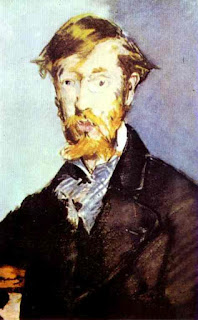
In the Moore Family there is no doubt that George took the part of Fredo. Old Moore, though it would be unwise thus to sneer, was a parliamentary thorn in the side of the landlord class to which he equivocally belonged, as he fought for reform of the system of land tenure but would not consider its total derogation. Peasants and land not the yearning for independence is the spiritual core of the Irish struggle and albeit as I previously recounted, an excellent landlord during the Famine of '47, his life was threatened and rents were tardy landing in the hat of the steward on gale days. Adrian Frazier tells the tale of how George Père sensing that the peasants were not so much restless as ebullient and requiring the calm of the cold metal spoon of the Master's pewter eye. The Moores were grey eyed hard riding men who did not baulk shocking English jockeys by their abandonment of due pause before a fence. Therefore in 1870 he came home to his 12,481 acres. He was dead within the week not from the uncertain discharge of a rusty fowling piece but twas apoplexy that took him. Dr. Barron a sound local man gave his diagnosis:
Mr.Moore has an attack of apoplexy such as statesmen very often get.
George Fils and his capers at boarding school in England from which he was expelled may well have contributed to that brick red congestion of the face which marks the condition but it is also certain that the long thin upper lip formed barbs of sarcasm which crushed back the already otter-like shoulders of his eldest son. The cover of the book shows the Edouard Manet portrait in which George looks like a whiskery otter that has emerged from the stream with a vaguely puzzled appearance.
By right of primogeniture George was now master with all the dwindling revenues of the estate, half afraid of the stove pipe hatted tenantry with their knee britches and their clay pipes and land league notions. Begob, says George, I'll go for an artist which he did, first to London and then to Paris in 1873. Excellent timing.
The French bohemians liked him and his landed credentials gave him an entrée into the salons of the Mme de Staël manques of the raffish upper class. He had a fine time soon realising that his talent as a painter was slight and here his characteristic lack of self-belief which kept him from settling in mediocrity moved him on to the writing of bad poetry. As a result of all the contacts that he made he later became Zola's man in England and the promoter of Impressionism there through his reviews.
Adrian Frazier's excellent biography runs to 604 pages of smallish print, copiously annotated and referenced. The scholarship runs smoothly without breaking up into lumps of sidebar disputation. Very readable indeed. The adventures of George in the book trade in which he took on the three volume tyranny of the circulating libraries is well covered as are his rows with everyone in the Irish Literary scene during his ten years residence in the heart of the Hibernian metropolis. It seems his impudent self-revelations seduced others to admissions which he gossiped about. One has the feeling that his squabble with Yeats who wrote with spiteful inelegance about him may have damaged his literary reputation. Frazier does not flinch at judging the seedier aspects of Moore's character.
2 comments:
No, George was more of a Michael but one who didn't eventually join the family business. Fredo was George's brother Augustus, whom he had to repeatedly bail out of trouble and who could make a living at nothing.
Stumbled upon your review and just had to make this comment!
Yes you’re right, definitely right. Nothing fits anymore. Just when I thought I was out…..
Post a Comment